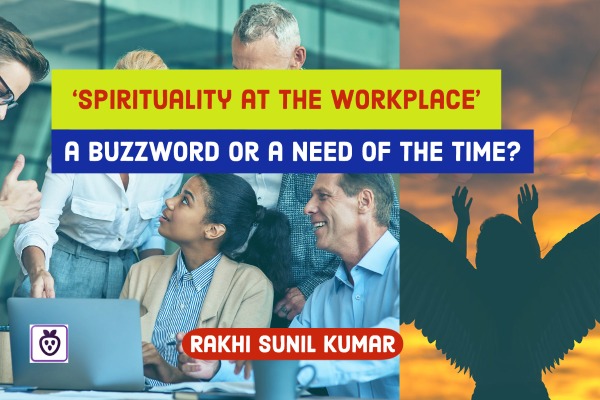‘Spirituality at the Workplace’, a buzzword or a need of the Time?

‘Spirituality at the Workplace’, a buzzword or a need of the Time?
Till a few decades back, organizations were reluctant to discuss spirituality in the workplace owing to its religious and communal connotations. But today organizations have realized that to maximize the potential of their employees, they must create an environment for the holistic development of their employees.
When I was working on the concept of ‘Balance of Life’ at the workplace while exploring the spiritual quadrant I tried to understand its scope, and what exactly it means. What should organizations focus on while designing the Spiritual needs at the workplace?
So what exactly is spirituality in the workplace?
‘Spirituality at the workplace is a concept which is still a work in progress. The various aspects of ‘Spirituality at the workplace currently discussed are- Ethics, Serving society, Holistic development of employees, Freedom of expression, Providing employees with a sense of purpose and meaning at work, and expression of faith and beliefs etc.
Many organizations confuse Spirituality at the workplace with the expression of Religious faith and beliefs, hence shy away from allowing it at the workplace, many organizations allow Religion expression, it is mostly restricted to the celebration of festivals etc and make some resources available to organize yoga and meditation classes.
But ‘Spirituality at the workplace is not about Religion. One must distinguish between Spirituality and Religion.
To understand what employees think about it, I asked a question to employees from different companies and age groups, “What do you understand about ‘Spirituality’ at the workplace?” in a survey conducted for my project ‘Balance of Life at the workplace.
A large number of employees said they want organizations to foster Spirituality in the workplace but they had no clarity about the scope of it. 64% said it is about ‘Values and Ethics. A very low 36% related to ‘Freedom of expression and 18% related to ‘Religious expression. 16% claimed they have no idea about it. 7% said that Religion and Spiritualism mean the same, a 26% related it to Diversity Inclusion.

Employees perception about Spirituality at Workplace
In the same survey, for another question “If given a choice, which part of yourself would you like to bring to your workplace?” 60% said they would like to bring their complete self and soul, while 40% said their competence only.
The fear of being judged in the workspace and an organisational environment which expects employees to think, talk and deliver only about the work assigned, employees fear sharing their true selves and bringing other aspects of themselves. One of my friends working in a leading IT company was reluctant to share his credentials as Poet with his co-workers. His reluctance stems from his fear of the Organizational environment and prejudices. Even in my case, the decision to publish my first novel, a romantic one while working in a Senior management profile, was a difficult one. I even contemplated using a pseudonym but then I decided to face it. In another example, one of my friends who used to conduct meditation classes in his personal time was cautioned by his boss that his image at work will be hampered, which might affect his career growth.
In the knowledge era of workers, when Organizations are continuously looking for innovation and creativity from their employees, then they must shift from a productivity-driven traditional mindset. Creating the best environment does not mean having the best cafeteria, sleep pods, colourful walls, or big buildings! But to bring the best out of their employees, organizations must create an environment where employees are not hesitant to be themselves.
Spirituality at the workplace is about bringing passion – bringing our heart, soul and spirit – to what we do because from a spiritual perspective, work has a deeper meaning and serves a higher purpose. Management Guru Drucker (1954) through his widely acclaimed book “The practice of management” mentioned that “the spirit that motivates, that calls upon a man’s reserves of dedication and effort, that decides whether he will give his best or just enough to get by”.
The organization must understand the needs of employees as Humans, their need to grow in all aspects of life, to have inner peace and calmness, and most importantly to lead a ‘Balanced Life. Organizations must create an environment where employees express themselves freely without the fear of being judged, they are encouraged to bring their 100% personality to the workplace. They must nurture their employees towards their holistic development, and give them space to grow into full-blown trees and not bonsais.
Organizations must take a step back and rethink how do they want to treat their employees – as workers or Human Souls?
Will they do ???
Rakhi Sunil Kumar
Note-
‘Balance of Life’ approach at workplace requires Organizations to have a holistic approach towards employees development. Organizations till now are doing in parts to help employees to have a better work life balance. The model suggests Organizations must work on 4 Quadrants of employees need – Career, Relationships, Social, Spiritual
This is in series to my research paper A study of Nextgen ‘Balance of Life’ Workplace in Indian Organizations published by International Journal of Scientific and Research Publications. Research paper can be downloaded http://www.ijsrp.org/research-paper-1021.php?rp=P11811719











